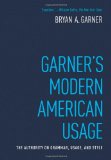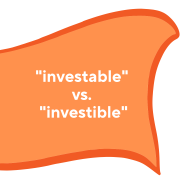“Investable” or “investible”–which spelling is correct?
How should you spell the word that may appear in descriptions of an asset management firm’s minimum requirements for clients—“investable” or “investible”?
My gut tells me “investable” with “a” because the definition depends on how much you are able to invest.

The case for “investable” over “investible”
-
- Merriam Webster’s Collegiate Dictionary includes “investable,” but not the alternative spelling. The same is true on Merriam-Webster.com, which AP style uses along with Garner’s (see #2 below) to justify its preference for “investable,” according to its “Ask the Editor” column. CollinsDictionary.com lists “investable” first, with “investible” as an alternative. Words into Type, an older reference book, says, “The correct spelling of words with the terminations -able or -ible is often puzzling. The student of orthography can find rules for the use of these endings, but it is more practical to learn the spelling of each word and refer to the dictionary if memory fails for the moment.”

- Garner’s Modern American Usage calls “-ible” “dead as a combining form in English,” while “-able” is a living suffix that may be added to virtually any verb without an established suffix.” It includes “investable” among “some of the hundreds of adjectives preferably spelled -able.” Grammarist.com explains: “Unlike –able, -ible isn’t used to make new words. It exists only in words retained from earlier stages of English.”
- The world is moving away from “investible” toward “investable,” at least as shown by Google Books Ngram data for the U.S. and the U.K. GrammarHow.com’s “Investible or Investable – Which Is Correct? (UK vs. US)” (unfortunately, the post is no longer online) looks at the Google Books Ngram for the two terms. It shows that the use of “investable” has grown steadily in U.S. books, while the use of “investible” has declined since 1950. In the U.K., “investible” initially dominated, but it has fallen below “investable” in the twenty-first century.
- Merriam Webster’s Collegiate Dictionary includes “investable,” but not the alternative spelling. The same is true on Merriam-Webster.com, which AP style uses along with Garner’s (see #2 below) to justify its preference for “investable,” according to its “Ask the Editor” column. CollinsDictionary.com lists “investable” first, with “investible” as an alternative. Words into Type, an older reference book, says, “The correct spelling of words with the terminations -able or -ible is often puzzling. The student of orthography can find rules for the use of these endings, but it is more practical to learn the spelling of each word and refer to the dictionary if memory fails for the moment.”
The case for “investible” over “investable”
- A Google search turns up more references to “investible” than to “investable,” and the imbalance has only gotten worse since I originally researched this back in 2010. Back then, I found about 393,000 references to “investible” vs. only 320,000 to “investable.” By 2020, the disparity was 2.79 million to 29.6 million. I don’t know how to explain these results, which contrast with the Google Books Ngram results discussed above.
- Fowler’s Modern English Usage says “The –ible form is the natural one for words derived from Latin verbs ending –ere or –ire, making adjectives in –ibilis.” I don’t know about “making adjectives in –ibilis,” but lo and behold, my dictionary says the word “invest” comes from the Latin investire. However, my copy of Fowler’s dates back to the 1960s.
- The Financial Times Lexicon went with “investible” when I originally researched this question in 2010 (sorry, the Lexicon link no longer works). I wondered if this could be a British thing, as Fowler’s is also British. However, when I searched the Financial Times website in 2022, instances of “investable” outnumbered “investible,” 965 to 193. This is consistent with the Google Books Ngram trend discussed above.
The SEC is a draw
A search of the SEC website yielded an equal number of results for both spellings. I wonder if it uses both as key words for search purposes.
The FINRA website gives “investable” a slight edge over “investible,” 108 to 98.
Do the two words have different meanings?
A reader suggested to me that the two words have different meanings:
Investible refers to an asset in which an investment can be made.
Investable refers to an asset that can be used to make an investment.
In ordinary usage, cash is investable but not investible, while shares are investible but not investable.
That’s an interesting theory. I haven’t found evidence in dictionaries to support it.
Still, the Nasdaq.com glossary shows only “investible” and defines it in the first sense listed above. However, a Nasdaq website search shows only four results using “investible” versus 24 for “investable.”
The bottom line: You should define your terms for your readers whether you use “investable” or “investible,” especially when the meaning isn’t clear from the context.
Note: I updated this blog post in 2015 to delete an outdated reference to an inactive poll. I expanded the post in October 2022 and updated it again in March 2023.




My view of the world is that you either keep a rule or you don’t. Do or don’t do, it’s up to you.
The rule is that investire is a Latin root and the word should be ‘investible’. My mother taught me this.
Financial writers prefer ‘investable’ perhaps they should spell other words this way: credable, irascable, incontrovertable, and of course, audable.
Tessa,
Thank you for commenting! Latin offers a set of rules that work for many people.
Basing a grammatical or (in this case) orthographic rule on the grammar of another language, no matter how fantabulous it may be, is the kind of absurdity that made most of us (except for the prescriptive grammarians) miserable in our grade school English classes. It’s one thing to say “divisible” is correct because English has the word “division”; there is nothing like “investion” in English. For cases like this, Garner’s analysis makes more sense: “-able” is productive because “able” is an English word; “-ible” is not.
Tom,
I’m with you!
Earlier this year, a reader emailed me with the comment below. I’d like to see some evidence to support this viewpoint, but I haven’t found anything yet.
=========================
Investible refers to an asset in which an investment can be made.
Investable refers to an asset that can be used to make an investment.
In ordinary usage, cash is investable but not investible, while shares are investible but not investable.
Hi Susan ,
I came across our blog on Investment writing I suppose the reader who sent you the comment goes well and I personally would go for it. I consider the same that “Investable” is an asset class and Investible is cash liquidity which is available to invest in investable asset.
I also searched like you did and found this one which I am pasting here
http://dictionary.cambridge.org/dictionary/business-english/investable
Hope that helps in keeping dialogue alive.
Good day.
Thank you for joining the conversation!
I’m still looking for a dictionary or other source that supports the idea that “investable” and “investible” have different meanings.
I am writing to disagree with Pratosh Dave’s notion that investible is a word. In the first place, Ms. Weiner was trying to get feedback on the idea. (See her 2nd post.) Also, the url doesn’t really support the ideas, which are opposite to the overall posts, which state that “x-able” means able to be xed).
There are many clearer ways of saying “an asset that can be used to make an investment,” such as cash, which includes non-paper assets sitting in banks, and “liquid net worth.”
Jason Taylor
http://jasontaylor.us
Thank you for commenting, Jason! When there’s so much disagreement, it’s often better to use a workaround. Your suggestion of describing the assets under discussion works as a solution.
Glad I found this. I was wondering what the correct spelling was and came across this post. I had a source use it in a quote.
Craig, I’m glad you found this post helpful.
Inexplicably, I prefer “investible” for most cases, but I am trying to release my grip on that to adopt what seems more common in my community, “investable.” Meanwhile, I still write “advisor,” when culture is pushing me hard toward “adviser.” It’s nice to tap into a group of folks who care about such things. Thank you.
Milt,
Thank you for commenting.
I still write “advisor,” too. I think the main thing is to consistently use one spelling.
I think that which you posted on Dec 20th, 2012 from another reader is correct.
If something looks like a good investment idea, it is an investible idea.
Whereas, if you have $3 Million to invest, those are your investable assets.
Only my opinion, but I have spent many years as an investment advisor and was a Latin Prize recipient back in the day. There is not a post here ? that I don’t appreciate.
Enjoy!
Ken,
Is there something about the rules of Latin that makes you see a difference between “investible” and “investable”?
Thank you for taking the time to comment!
Great article Miss Susan. Thank you.
The FT Lexicon might go with -ible, but a search reveals that its writers overwhelmingly prefer -able (and even Google asks: “Did you mean: investable”). The results also show FT writers using -able for both of the meanings described above, even in headlines.
https://www.google.com/search?q=site:www.ft.com+investable
https://www.google.com/search?q=site:www.ft.com+investible
Similar searches show that Bloomberg and Reuters lean just as strongly towards -able. The Wall Street Journal favours -able, but much less strongly, while The Economist style guide explicitly says -ible (http://www.economist.com/style-guide/spellings).
Conclusion: Both are acceptable, just be consistent. If in doubt, go with the more common -able. Avoid where possible.
Thanks for sharing the results of your research, Nick. I agree that consistency is key.
Excellent thread. I’m a British translator (from Italian) and one of my clients is an “ethical” asset manager who uses Investable Universe a lot in their literature to mean the set of companies they are willing to invest in on ESG grounds. Interesting to find my doubts reflected here, and that the consensus of opinion seems to have swung slightly in favour of “able” over the last 7 years. I think the question as to what is the “right” answer in these cases depends to a large extent on what most people with a clear idea of the meaning of the word use, rather on than any arcane grammatical rules. Over time, the former will almost always trump the latter.
Thank you for your comment, Prem!
I think it’s both appropriate and inappropriate to use the ‘ible’ . As a financial writer you need to be clear to your client and make words that shouldn’t distract thought away from central messages. However I think I write for the benefit of the reader and not myself. I know ‘ible’ is correct, but will only use it when I feel the reader is at ease with it. If I write ‘able’ to an english professor he or she, I imagine, might think, “Hmm, he spelt that wrong, I wonder what other things he’s got wrong in this report?”
Thank you for commenting, Steve! You pose an interesting dilemma. I wonder if there’s a workaround that uses neither form of the word. I’m thinking of how one might write “Treasury bonds” if you can’t decide whether to pluralize Treasury with -ies or -ys.
Used as nouns investables are what you invest and investibles are what you invest in. “I used my investables to buy some investibles.” They can also be used as adjectives.
Rick, Thank you for taking the time to comment!
I haven’t seen that explanation before. Is there a style guide or other reference that explains the reasoning behind it?